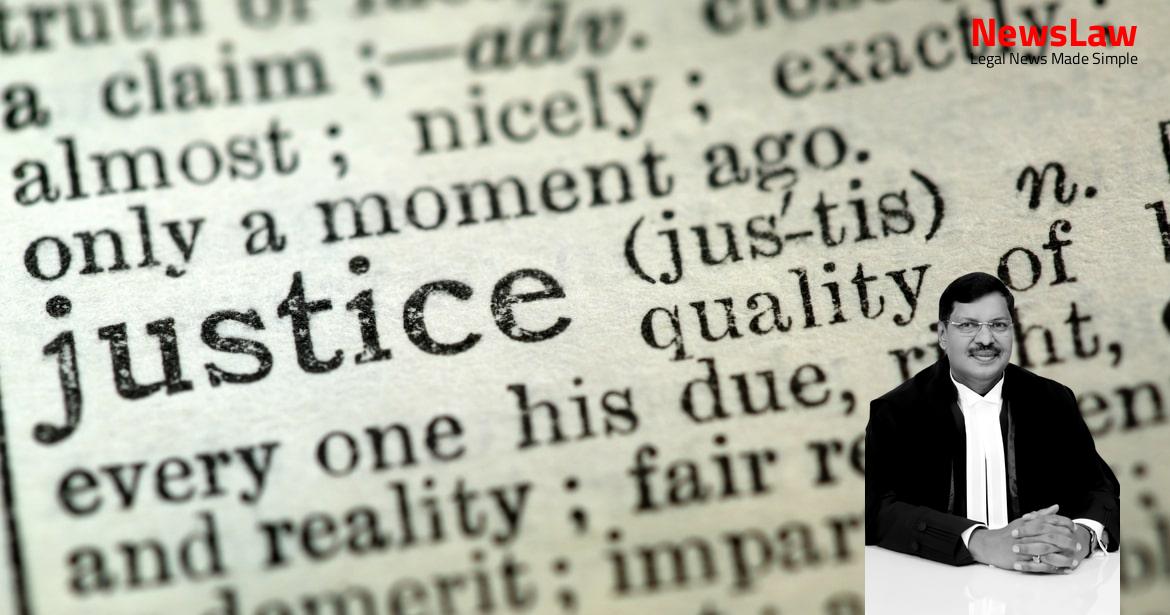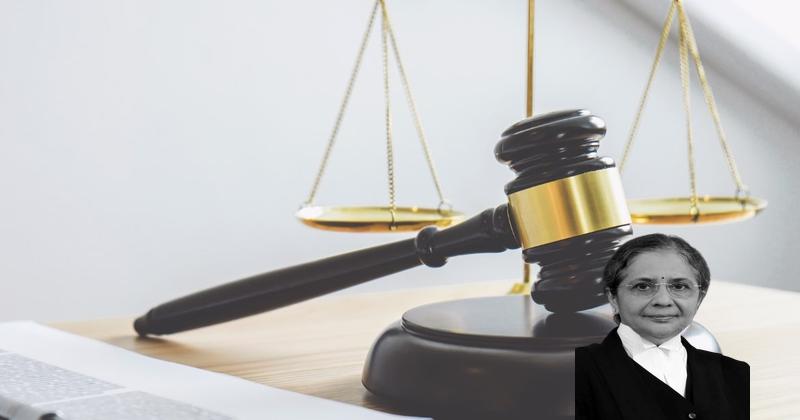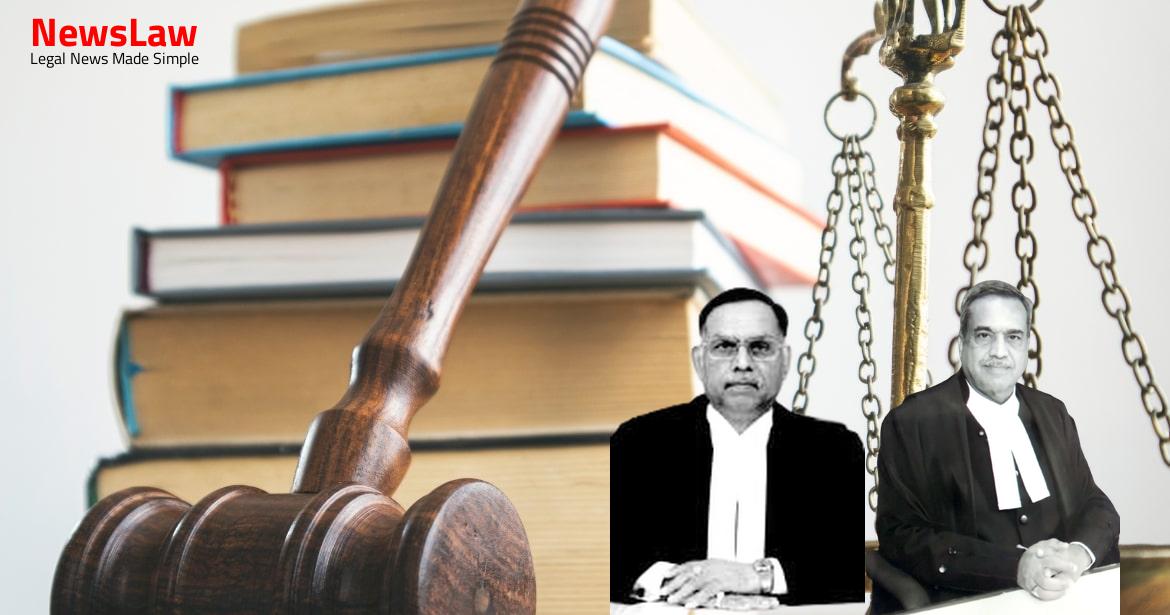Delve into the recent legal case focusing on the High Court’s emphasis on fair trials and legal analysis. The court’s decision to remit the case for a retrial highlights the significance of ensuring justice through proper legal procedures. Follow the key insights into how the court’s approach aims to safeguard the integrity of the legal process and uphold principles of fairness in legal proceedings.
Facts
- The High Court ordered a retrial based on the ground of ‘fair and full trial’ not taking place.
- The plea of self-defense and the argument of both offences being committed in the same transaction were rejected by the courts below.
- The High Court dismissed the appeal challenging the acquittal and confirmed the sentence imposed on the accused.
- The High Court remitted the judgments of conviction and acquittal for retrial, directing that the trials be clubbed and tried together.
- The High Court observed that trying the FIRs separately would lead to illegality as the offences were connected and part of the same transaction.
- Various common witnesses and evidence were noted to be present in proceedings of different FIRs.
- The Court upheld the decision of ordering a retrial citing infirmities in the prosecution’s case.
- The Trial Judge found no sufficient evidence for the appellant’s involvement in the offences under Sections 306, 217, and 218 of the Penal Code.
- The High Court remitted the case back for retrial in the interest of justice and fairness.
- A larger Bench confirmed the retrial in exceptional situations for delivering justice.
- The Appellate Court directed the merging of evidence from both FIRs to be tried together under Section 223 CrPC.
- The benefit of earlier recorded evidence during the trials would be considered in the retrial.
- The issue of holding separate trials and the High Court’s direction for a de novo trial were discussed in the case.
- The appellant, Nasib Singh, was implicated in FIR 96 of 2012 for the gang rape of the prosecutrix.
- The investigation conducted by the appellant in FIR 96 of 2012 was found to have loopholes by the Special Investigating Team (SIT).
- Balwinder Singh, Gurpreet Singh, and Shinderpal Kaur were accused of committing acts of sexual assault on the prosecutrix.
- The prosecutrix alleged being forcibly administered an intoxicant, becoming semi-conscious, and being repeatedly raped by Balwinder Singh and Gurpreet Singh in the motor shed.
- FIR 187 of 2012 was registered against the accused for an offense under Section 306 read with Section 34 of the IPC.
- After the suicide of the prosecutrix, the appellant arrested Balwinder Singh, Gurpreet Singh, and Shinderpal Kaur for abetting her suicide.
- FIR 100/2012 was registered against the appellant and others for abetting the suicide, but later cancelled since the suicide occurred within the jurisdiction of PS Samana.
- Appellant, SI Nasib Singh, was dismissed from the Police Department on 27 December 2012.
- Charges were framed against the accused under Section 306 IPC, with additional charges of Sections 217 and 218 IPC against the respondent.
Also Read: Electoral Malpractices in Mayor Election
Arguments
- Remitting for clubbing of the trials is the only option that would render justice.
- The suicide of the prosecutrix is alleged to be a consequence of the alleged gang rape, falling within the ambit of Section 223(d) of the CrPC.
- The High Court recorded that the prosecution sought to rely on evidence from both FIRs 96 and 187.
- The order of retrial does not cause prejudice to the appellant, as fresh charges were directed to be framed for him.
- The appellant can seek a discharge at the stage of framing fresh charges.
- Shinderpal Kaur did not appear in the proceedings despite being served.
- Mr Narender Kumar Verma appeared on behalf of Sandeep Singh.
- Mr D Bharat Kumar was requested to assist the Court as a micus curiae due to Shinderpal Kaur’s absence.
- The submissions by Mr D Bharat Kumar covered the arguments of all accused-respondents regarding the remittance of their conviction and sentence for a re-trial.
- Section 386 of the CrPC outlines the powers of the Appellate Court, including the authority to order a retrial in certain circumstances.
- The interpretation of the Appellate Court’s power to direct a re-trial has been addressed in various prior decisions.
- Dr Nishesh Sharma appeared on behalf of Gurpreet Singh in the proceedings.
Also Read: Balancing Power and Transparency: Electoral Bonds Struck Down, Disclosure Mandated
Analysis
- High Court observed that separate trials in FIR 96 and FIR 187 led to a miscarriage of justice with no detailed analysis provided.
- The court held that joint trials are the rule unless proven to cause difficulty.
- Misjoinder of parties alone cannot be the sole reason to set aside a conviction, it must be proved to cause a failure of justice.
- The need for a joint trial is dependent on whether prejudice has been sustained as a result of a separate trial.
- An order of retrial typically wipes out the evidence from the earlier stage.
- The High Court remanded both cases for retrial ‘to maintain balance and delivery of justice.’
- The respondents failed to demonstrate how separate trials led to a miscarriage of justice.
- No in-depth explanation provided on how separate trials caused prejudice or miscarriage of justice.
- Section 223 allows persons accused of different offences in the same transaction to be tried together.
- The power to order a retrial is exceptional and should be a matter of last resort.
- A retrial cannot be ordered solely based on the lack of proper evidence from the prosecution.
- Retrial can be ordered in exceptional circumstances to prevent a miscarriage of justice.
- Mere lapses in investigation are not enough to warrant a retrial.
- The court must assess if a ‘shoddy’ investigation/trial has prejudiced the parties.
- Retrial wipes out earlier proceedings and exposes the accused to a new trial.
- Retrial may be directed if there is a failure of justice and must be mindful of pending cases in trial courts.
- Retrial can be ordered if serious illegalities or irregularities taint the original trial.
- Appellate Courts may direct retrial if necessary for justice, based on specific circumstances of each case.
- Section 223 deals with situations where more than one person is involved in the commission of an offence.
- Various clauses in Section 223 provide for when persons may be charged and tried together, such as when they are accused of the same offence in the same transaction or of different offences in the same transaction.
- Provisions like Section 222 allow for convictions of minor offences even if not originally charged, based on proof of certain combinations of acts.
- The court may order a retrial if there is a miscarriage of justice, such as trial in absence of jurisdiction, illegality, or preventing the prosecutor from presenting evidence.
- Principles for conducting joint and separate trials are outlined, considering prejudice to defense, judicial delay, and possible miscarriage of justice.
- Different sections like 220 and 219 provide for charging and trying a person for multiple offences within a certain time frame or for acts forming the same transaction.
- It is emphasized that a joint trial should be decided at the beginning of the trial and should not prejudice the rights of the accused or prosecutrix.
- Appellant failed to establish serious prejudice in a retrial due to the death of key witnesses
- Retrial would not ensure justice in a heinous crime alleged to have been committed
- Separate trials were not contrary to law
- No demonstrated failure of justice in holding separate trials
- State of Punjab has not appealed against the retrial ordered by the High Court
Also Read: Recall of Resolution Plan Approval: Legal Analysis
Decision
- The appeal is allowed and the judgment of the High Court is set aside.
- Pending applications are disposed of.
- All criminal appeals disposed of by the High Court are restored to the file for fresh disposal on merits.
Case Title: NASIB SINGH Vs. THE STATE OF PUNJAB (2021 INSC 642)
Case Number: Crl.A. No.-001051-001054 / 2021



